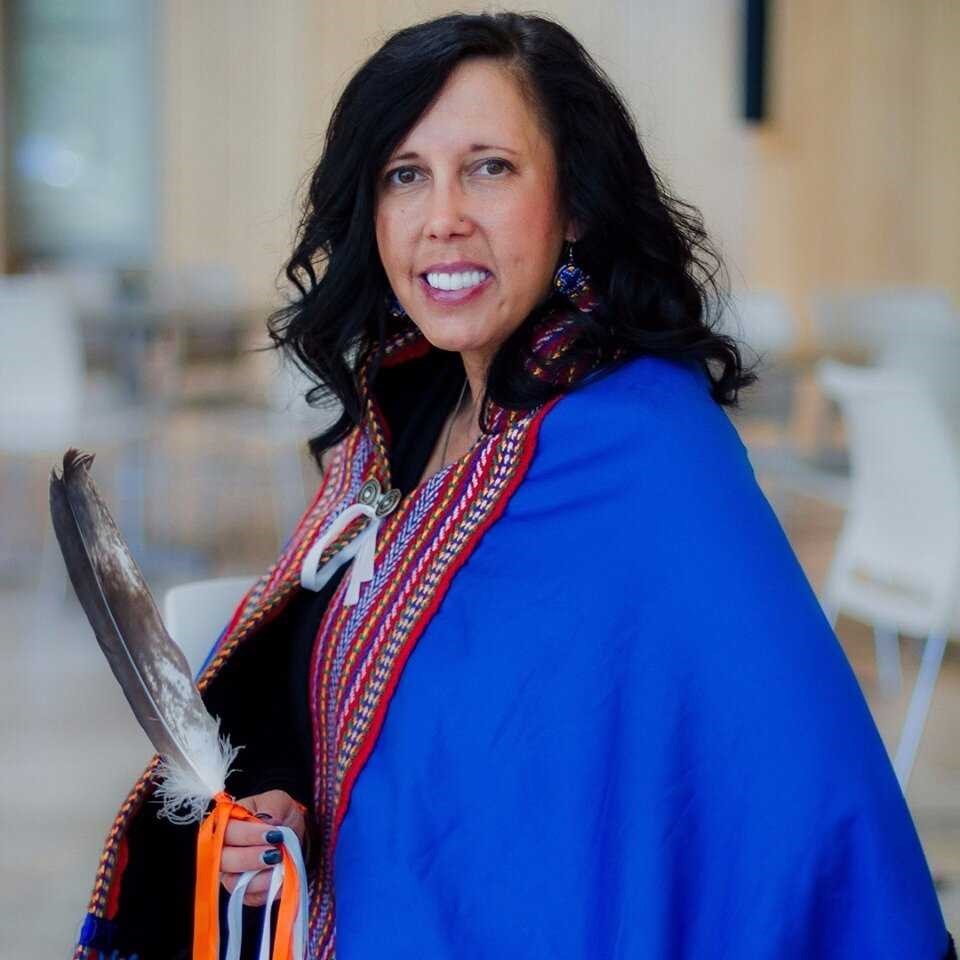SASKATOON – A prominent national leader, visionary and researcher in Indigenous health—Carrie Bourassa of the University of Saskatchewan (USask)—was honoured with an Achievement Award from the Saskatchewan Health Research Foundation (SHRF) today.
The award was announced as part of SHRF’s online Santé celebration event at which USask medical imaging researcher Humphrey Fonge was awarded the Impact Award and six USask health researchers were awarded Excellence Awards.
As scientific director of the USask-based CIHR’s Institute of Indigenous Peoples’ Health and a faculty member in the College of Medicine, Bourassa’s leadership and knowledge are sought after around the world—from the community to the institutional level.
“Carrie’s outstanding work has influenced policies and shaped strategic directions that have been instrumental in creating change in how institutions engage with Indigenous communities,” said USask Vice-President Research Karen Chad. “She is building capacity for community-driven research that will help address the health gap faced by Indigenous peoples in Canada.”
Bourassa has paved the way for transformative change in the capacity for Indigenous communities to hold and administer research funds so that they may direct their own health research that is relevant to the community and on their own terms. This work has made Canada a world leader in this approach.
“Carrie has earned the respect and trust of community leaders, government officials, colleagues and trainees alike. Her ability to engage, listen and take direction from community, Elders and other invested stakeholders demonstrates true authentic leadership,” said SHRF CEO Patrick Odnokon.
Bourassa’s achievements include the establishment of a national network of centres focused on research, research capacity development, and knowledge translation centred on First Nations, Inuit and Métis Peoples. She is a mentor and research lead at Morning Star Lab which focuses on community-based research into hepatitis C/HIV/AIDS, aging, dementia, and Alzheimer’s disease, as well as water governance and policies.
Recently, she has played a critical role in ensuring that Canada’s COVID-19 response protects Indigenous communities across the country, serving as the Indigenous Engagement Lead of the country’s COVID-19 Immunity Task Force.
“The impact of her work can be measured by the number of publications, technical reports, invited presentations, and grant dollars attained—indicators of success that would more than demonstrate excellence in research productivity and her ability as a scientist,” said Odnokon.
“However, her success can also be defined by the impact she has on her community, peers and students, and that is why there is no doubt that Dr. Bourassa is deserving of this year’s Achievement Award.”
SHRF’s Impact Award recognizes research that builds capacity, advances knowledge and informs decision-making in health care. USask College of Medicine researcher Humphrey Fonge, who is also a radiopharmacist with the Saskatchewan Health Authority, was honoured with the Impact Award for his work in developing new precision drug molecules that target resistant types of breast cancers.
The aim is of Fonge’s research is to significantly improve the survival of breast cancer patients. With preliminary data showing positive results for killing tumours in mice, Fonge and his team are gathering the data needed to move the work into clinical trials.
Fonge’s bench-to-bedside research also extends to other cancer types, notably prostate, lung, colorectal and neuroendocrine tumours. He has obtained Health Canada approvals for new diagnostics agents, and clinical trials are ongoing.
Excellence Awards were presented to the six top-ranked researchers and teams that received SHRF funding for their projects in the past year:
Dr. Walter Siqueira of the College of Dentistry—Top Establishment Grant: Biomedical
for his work to develop an innovative chair-side diagnostic method for detecting stages of periodontal disease using saliva.
Sarah Donkers of the School of Rehabilitation Science—Top Establishment Grant: Socio-Health
for her work towards a neurorecovery model of care for multiple sclerosis physical rehabilitation in Saskatchewan.
Yuliang Wu and Dr. John DeCoteau of the College of Medicine—Top Collaborative Innovation Development Grant: Biomedical
for the team’s work to identify drugs targeting an RNA helicase (enzyme) named DDX41 whose mutations cause leukemia diseases.
Paulette Hunter of St. Thomas More College, a federated college of USask—Top Collaborative Innovation Development Grant: Socio-Health
for her team’s work seeking a practical solution, using video-assisted patient education, to improve communication among health-care providers, residents, and families about end-of-life issues and care.
Dr. Bhanu Prasad of the College of Medicine and the Saskatchewan Health Authority—Top Collaborative Innovation Development Grant: Clinical
for his team’s work to determine whether catheter-based renal denervation is a meaningful addition to the treatment options for Loin Pain Hematuria Syndrome, a rare and poorly understood pain syndrome.
Marta Erlandson and Corey Tomczak of the College of Kinesiology, and Kristi Wright of the University of Regina Faculty of Arts—Top Sprout Grant
for the team’s work to test the effectiveness of an innovative six-month chronic disease management program for children with congenital heart disease.
The online event brought together Saskatchewan’s health research community and SHRF partners to celebrate the impact of the work that is helping improve the health of Saskatchewan citizens, while creating a high-performing health ecosystem and build a robust culture of research and innovation.
More information about the award-winning research is available here:
https://www.shrf.ca/post/2020-achievement-award-winner-profile
https://www.shrf.ca/post/recognizing-the-impact-of-dr-humphrey-fonge
About SHRF:
Saskatchewan Health Research Foundation (SHRF) is the provincial funding agency that funds, supports and promotes the impact of health research that matters to Saskatchewan, by collaborating with partners to support local researchers to help find homegrown solutions to the health challenges the province faces. Visit shrf.ca/sante-awards to see a full list of award recipients and stories about the impact of their work.



